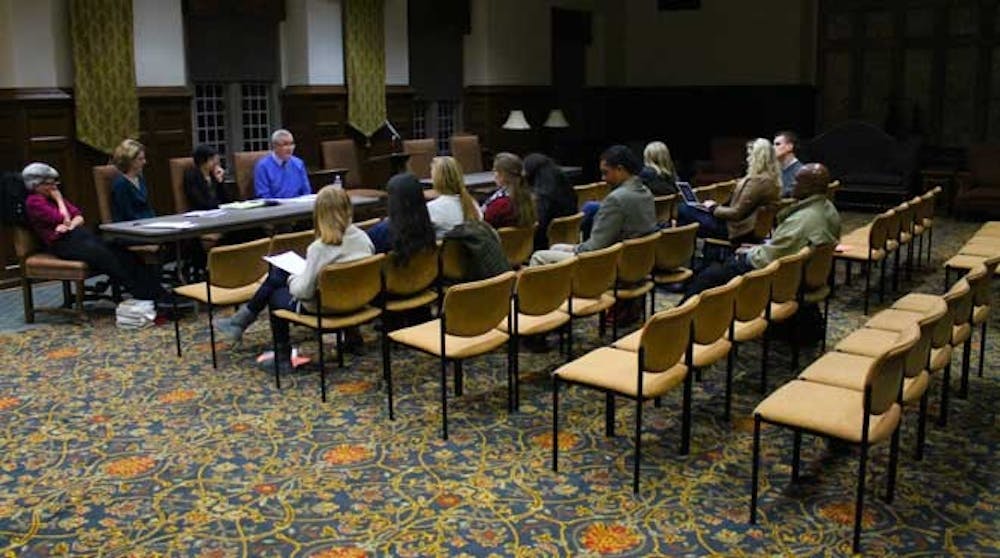Robert Agaba, who will graduate from University of Richmond this May with a degree in international studies, describes himself as a "gregarious, talkative guy." Other students have said they enjoyed his endearing stories about his wife and 7-month-old daughter.
But underneath Agaba's cheerful outlook are personal memories of a genocide that shook the world just two decades ago. He said he appreciated the opportunity to reflect with other members of the Richmond community during Rwanda Week, an event that the political science department arranged March 24-29 to commemorate the genocide.
Agaba, a citizen of Rwanda, is unsure of his exact age but estimates it to be about 29 years old. He was old enough in 1994 to still have vivid memories of events surrounding the deaths of 800,000 Rwandans that year. April 7, 2014, will be the 20th anniversary.
"Even to this day, there are bones still being dug up," Agaba said. "That's how bad it was. Plants are coming up where bones are buried. Houses are coming up over graves."
Agaba said the killings had devastated his village, as they did every other community in Rwanda. And even now, he finds it difficult to talk about his memories because they are so sensitive, he said.
"Those who have the courage share their stories. We cry about it. We encourage each other," Agaba said. "But most of the time, it's just sitting in silence and praying and hoping that it never happens again. None of us have the words to say exactly what happened."
Monti Datta, a professor of political science at Richmond, co-directed Rwanda Week with Sandra Joireman, a professor of political science and international studies. Joireman said the commemoratory week had three purposes: to join in worldwide remembrance of the genocide, raise awareness of crimes against humanity and raise concern for human rights.
"These things have not happened only in the past," Joireman said in reference to ethnic cleansing and other human rights violations. "We see them currently."
Events included a screening of the film "Hotel Rwanda," an evening of corporate spiritual reflection, a panel discussion among faculty and community experts and a tour of the Virginia Holocaust Museum.
Except for the museum tour, all of the events had fewer than 10 students in attendance. Datta said he had expected a low turnout because it was a busy time of year for students, and at Richmond, student interest in African history was not widespread.
But Datta said he hoped awareness of human rights issues in general would increase so that Richmond would eventually be known as an institution that students would choose based on its human rights curricula.
Andrew Goodman, Richmond's campus rabbi, organized the Holocaust Museum tour, which approximately 30 students and another 30 faculty and staff members attended. Goodman said the tour had originally been scheduled for February but was postponed because of bad weather. He said rescheduling it during Rwanda Week was perfect timing.
Enjoy what you're reading?
Signup for our newsletter
"Of course, it became obvious that we could tie these two initiatives raising awareness of these two genocides," Goodman said.
"We, as a society, haven't learned the lesson about genocide yet, and this has relevance to our campus," he said. "Genocides are able to be carried out because there aren't people stepping in and stepping up."
As the university's only current Rwandan student, Agaba said few people at Richmond had asked about his personal memories of the genocide since he had enrolled. "It's removed from their experience, and from anything they can associate it with," he said.
Agaba said he would tell any student wondering why he or she should care about the genocide: "We live on earth together. The fact that I am here talking to you proves how this world is interconnected. If genocide happens in Rwanda, what would prevent it from happening elsewhere?"
Contact reporter Catherine Sinclair at catherine.sinclair@richmond.edu
Support independent student media
You can make a tax-deductible donation by clicking the button below, which takes you to our secure PayPal account. The page is set up to receive contributions in whatever amount you designate. We look forward to using the money we raise to further our mission of providing honest and accurate information to students, faculty, staff, alumni and others in the general public.
Donate Now



